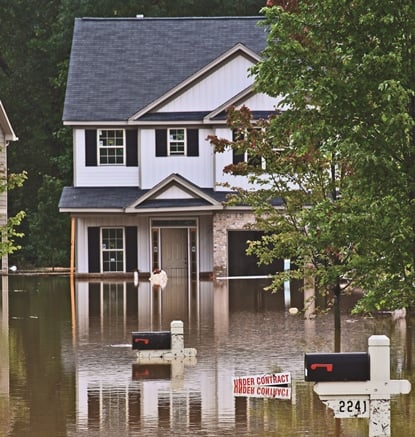After seeing such broad support in the House, it seemed only a matter of time before the Flood Insurance Market Parity and Modernization Act would pass the Senate and become law. For National Association of Professional Surplus Lines Offices (NAPSLO) officials, though, the work continues to push what they see as their top federal legislative priority across the finish line.
The bill essentially clarifies language in the Biggert-Waters Flood Insurance Reform Act of 2012 (BW-12) regarding the ability of privately issued flood insurance to meet lenders’ mandatory purchase requirements. When BW-12 was originally reported out of the House, it specified that lenders shall accept private flood insurance for mandatory purchases. However, language added later in the process before BW-12 was passed led to confusion among lenders evaluating policies for the purpose of mandatory flood insurance requirements.
The Flood Insurance Market Parity and Modernization Act defines private flood insurance as “a policy issued by a company licensed, admitted, or otherwise approved by the state.”
“All we’re doing in this legislation is clarifying that the surplus lines market is in fact an eligible market from which to accept a private flood insurance policy,” says NAPSLO Executive Director Brady Kelley.
“I say that because surplus lines insurers have long written flood insurance policies — this isn’t a new opportunity,” he continues. “Before BW-12 was signed, our market has always served as a supplement to the NFIP. There are a number of homes and commercial properties that don’t fit within the terms and conditions of the NFIP policy. So we’ve oftentimes served as an excess option, or an option when the NFIP policy doesn’t do the trick.”
Kelley adds, “From that perspective, the primary goal is to preserve the types of solutions the market was already providing.”
Related: How to avoid becoming a victim of 'flood vehicle' fraud

(Photo: Kelly Farrar)
Senate version differs
Back in April, the House version of Flood Insurance Market Parity and Modernization Act, H.R. 2901, easily passed by a vote of 419-0. Keri Kish, NAPSLO’s director of government relations, notes, however, that behind the apparent smooth sailing was actually the result of a lot of hard work — work that began back in 2014 to educate legislators not just on the bill, but the surplus lines marketplace in general.
“It’s not something everyone just knows about and understands,” Kish says of surplus lines. “Our education really helped them understand how the surplus lines market functions as part of the private insurance market — how we developed and why it’s important to maintain our ability to provide those options.”
With respect to the Senate’s version of the bill, S.1639, discussions with legislators have a different twist than in the House. Kish says it is more a matter of timing than concern about surplus lines. For one, Washington is in election mode, and some Senators are in tough races. On a related note, there is limited time left for the 114th Congress. Senators are wrapping up a number of initiatives, and, depending on who controls the November election, there could be a lame duck session to close out the year.
“We’ll know more after the elections,” says Kish.
Additionally, senators know that there will be increased focus on the topic of flood insurance next year as Congress will work on a reauthorization of the National Flood Insurance Program (NFIP). Some Senators, says Kish, wonder why they should address the flood issues in the Flood Insurance Market Parity and Modernization Act when they are going to spend so much time on flood next year. “Can’t we wait until then to address it?” Kish says, summing up the feelings of a handful of senators.
“What we are emphasizing is this is a distinct issue from reauthorization,” she says. “This is going to help the private market develop, which was the key point of BW-12. We just need this bill to pass in order to help effectuate that plan.”
Related: The aftermath: Louisiana insurance agents assist clients while dealing with own losses

(Photo: iStock)
Bill has bi-partisan support
Kelley concurs: “We see this as an important first step in promoting the private market as an alternative to the NFIP.”
He adds, “Again, our interest in the beginning was preserving what the surplus lines market was able to underwrite.” But he adds that, as legislators talk about reforming the NFIP, with broad agreement that the private market should be prepared to offer more solutions, passing S.1639 is a logical first step.
“Let’s put that in place now,” says Kelley. “Let’s let the industry respond to that and start to develop new products — commercial and residential property products — as Congress further works to reform the NFIP in 2017.”
NAPSLO members are optimistic about getting S.1639 passed, although, as Kish states, “We are optimistic but we’re also realistic.” She says work will continue as far as holding further discussions with key senators — particularly those on the Senate Banking Committee. “For members that indicate support, we’ll ask them to sponsor the legislation and to talk to their fellow members in regards to sponsoring,” she says.
Scott Culler, NAPSLO Legislative Committee Co-Chair and regional president, Markel West Insurance Services, says the overall strategy from the House to the Senate is the same: “I think it’s the same process of making sure we educate the senators on what we’re trying to get accomplished — and that we’re not trying to replace NFIP, but to supplement it.”
Lana Parks, NAPSLO Legislative Committee Co-Chair and president of managing general agency The Parks Group, Inc., says “It has support in the House Financial Services Committee, where it passed 53-0, and then passage by the full House 419-0 — I think that speaks volumes about the amount of support this measure has. This is non-controversial.
She adds, “I’m optimistic it will pass this year. There’s no reason not to do it now. Ultimately this is giving consumers choices. I can see no policy concerns in passing it this year.”
As for the potential impact on the marketplace, Parks says carriers she represents do not currently offer many flood products, but with the clarity provided by this bill, “I do see it as an opportunity — as something we should consider pursuing. If you’re doing a package [property] policy, it only makes sense to offer other perils that you can cross-sell and offer whole coverage.”
Related: Time to act on flood bill
Save
Save
Save
Save
Save
Want to continue reading?
Become a Free PropertyCasualty360 Digital Reader
Your access to unlimited PropertyCasualty360 content isn’t changing.
Once you are an ALM digital member, you’ll receive:
- Breaking insurance news and analysis, on-site and via our newsletters and custom alerts
- Weekly Insurance Speak podcast featuring exclusive interviews with industry leaders
- Educational webcasts, white papers, and ebooks from industry thought leaders
- Critical converage of the employee benefits and financial advisory markets on our other ALM sites, BenefitsPRO and ThinkAdvisor
Already have an account? Sign In Now
© 2025 ALM Global, LLC, All Rights Reserved. Request academic re-use from www.copyright.com. All other uses, submit a request to [email protected]. For more information visit Asset & Logo Licensing.








